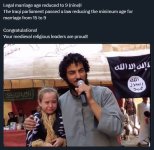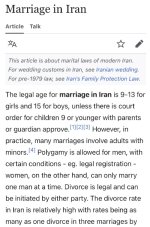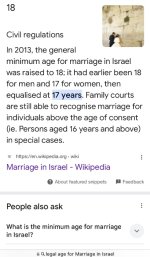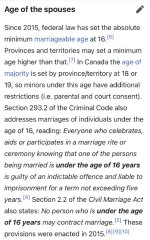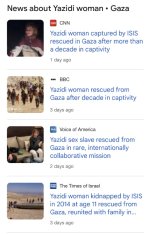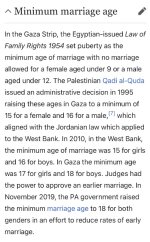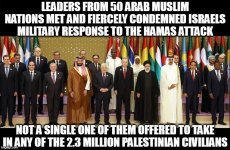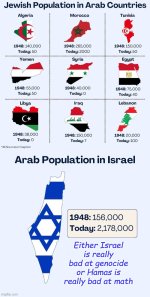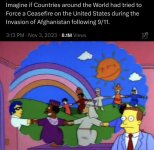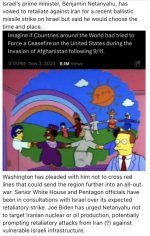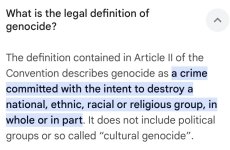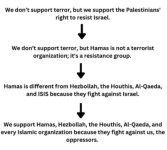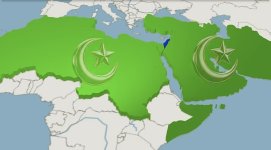Iran's supreme leader appeared at Friday prayers in Tehran and said Iran would not hesitate to attack Israel again after this week's ineffective missile barrage. The civilian death toll grew in Lebanon as Israel continued its airstrikes in Beirut aimed at Hezbollah.

 apple.news
The commander-in-chief of Iran’s Islamic Revolution Guard Corps (IRGC), Maj-Gen Hossein Salami, stood in front of a large banner in a war room as he used a telephone to order the launch of about 200 ballistic missiles at Israel on Tuesday night, according to a video clip published by Iranian media.
apple.news
The commander-in-chief of Iran’s Islamic Revolution Guard Corps (IRGC), Maj-Gen Hossein Salami, stood in front of a large banner in a war room as he used a telephone to order the launch of about 200 ballistic missiles at Israel on Tuesday night, according to a video clip published by Iranian media.
The banner featured photos of the three men whose deaths he said Iran was seeking to avenge with the major attack - Hamas political leader Ismail Haniyeh, who was killed in Tehran in July in an attack that Iran blamed on Israel, and Hezbollah leader Hassan Nasrallah and IRGC Quds Force operations commander Brig-Gen Abbas Nilforoushan, who were killed in an Israeli air strike in Beirut last week.
The IRGC claimed the barrage included Fattah hypersonic missiles that took 12 minutes to reach Israel and that they successfully hit targets including three Israeli airbases and the headquarters of the Mossad spy agency.
However, the Israel Defense Forces (IDF) said most of the missiles were “intercepted by Israel and a defensive coalition led by the United States”, and that there were a “small number of hits” in central and southern Israel.
Shortly after the attack, a massive banner was raised in Tehran’s Palestine Square, featuring missiles flying towards buildings shaped like a Star of David and the words “The beginning of the end of Zionism”.


 apple.news
Iranian weapons, training and funding have been pivotal to Hezbollah’s transformation into Lebanon’s most powerful armed force and political actor since the IRGC helped establish the group in the 1980s.
apple.news
Iranian weapons, training and funding have been pivotal to Hezbollah’s transformation into Lebanon’s most powerful armed force and political actor since the IRGC helped establish the group in the 1980s.
Before this month, Iranian leaders had hoped that a war of attrition with Hezbollah would help wear down the Israeli military, which is still fighting a war against Hamas in Gaza.

They also relied on Hezbollah and its massive arsenal of rockets and missiles to serve as a major deterrent against direct Israeli attacks on their country’s nuclear and missile facilities.

President Masoud Pezeshkian, who was elected in July, accused Israel of trying to provoke Iran into a regional war that would also draw in the US. The above illustration shows Israel provoking Iran.

 apple.news
Israel has vowed to respond severely, with Netanyahu warning that "Iran made a big mistake and it will pay for it". Biden’s National Security Adviser Jake Sullivan warned there would be “severe consequences” for the Iranian attack and that the US will “work with Israel to make that the case”.
apple.news
Israel has vowed to respond severely, with Netanyahu warning that "Iran made a big mistake and it will pay for it". Biden’s National Security Adviser Jake Sullivan warned there would be “severe consequences” for the Iranian attack and that the US will “work with Israel to make that the case”.
Iran's supreme leader makes new threats against Israel — NBC News
Iran's supreme leader appeared at Friday prayers in Tehran and said Iran would not hesitate to attack Israel again after this week's missile barrage. The civilian death toll grew in Lebanon as Israel continued its airstrikes in Beirut aimed at Hezbollah. NBC News' Richard Engel reports.
The banner featured photos of the three men whose deaths he said Iran was seeking to avenge with the major attack - Hamas political leader Ismail Haniyeh, who was killed in Tehran in July in an attack that Iran blamed on Israel, and Hezbollah leader Hassan Nasrallah and IRGC Quds Force operations commander Brig-Gen Abbas Nilforoushan, who were killed in an Israeli air strike in Beirut last week.
The IRGC claimed the barrage included Fattah hypersonic missiles that took 12 minutes to reach Israel and that they successfully hit targets including three Israeli airbases and the headquarters of the Mossad spy agency.
However, the Israel Defense Forces (IDF) said most of the missiles were “intercepted by Israel and a defensive coalition led by the United States”, and that there were a “small number of hits” in central and southern Israel.
Shortly after the attack, a massive banner was raised in Tehran’s Palestine Square, featuring missiles flying towards buildings shaped like a Star of David and the words “The beginning of the end of Zionism”.

Iran gambles with Israel attack after humiliating blows to allies — BBC News
Iran's leaders brace for Israeli retaliation after firing about 200 ballistic missiles.
Before this month, Iranian leaders had hoped that a war of attrition with Hezbollah would help wear down the Israeli military, which is still fighting a war against Hamas in Gaza.

They also relied on Hezbollah and its massive arsenal of rockets and missiles to serve as a major deterrent against direct Israeli attacks on their country’s nuclear and missile facilities.

President Masoud Pezeshkian, who was elected in July, accused Israel of trying to provoke Iran into a regional war that would also draw in the US. The above illustration shows Israel provoking Iran.
Iran gambles with Israel attack after humiliating blows to allies — BBC News
Iran's leaders brace for Israeli retaliation after firing about 200 ballistic missiles.

